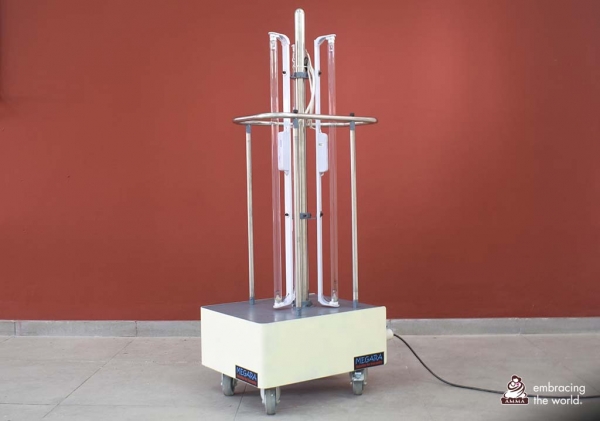In September 2020, Prabha was deployed at Amrita Hospital in Kerala in the throes of COVID-19. In March this year, the robot was launched at the Amrita School of Ayurveda, Amritapuri Campus.
Amrita’s Humanitarian Technology Labs (HuT Labs) is an engineering research lab using robotics to find solutions to social issues. HuT Labs collaborated with Megara Robotics, a private enterprise in Tamil Nadu, to develop Prabha, and the team completed its first successful prototype in June 2020.
The ultimate goal is to make Prabha as widely available as possible during this hour of need for the world, and as such, the selling price for the first model has been established at ₹13,500 ($180 US). The robot was developed in the context of medical institutions during the pandemic, but can also be used in many locations where communicable diseases are a risk, including classrooms, office spaces, restrooms, living rooms and more.
Dr Rajesh Kannan Megalingam heads Hut Labs and is with Amrita’s Department of Electronics and Communication, School of Engineering. He says all university departments are continuing to develop solutions to help society deal with the devastation of the coronavirus.
“The whole purpose of Amrita HuT Labs is to make robots for humanitarian ends. Robots that can assist sick people or that can do jobs that are unsafe for humans,” he said.
“For example, some of our early successes were with the creation of a low-cost self-driving wheelchair and a Cocobot that harvests coconuts from places so high that if a human climber were to fall, he would certainly be killed. So, as soon as we realized the seriousness of COVID-19, we began working on robots connected with the pandemic.”
Other inventions at Amrita’s HuT Labs include:
Maruti - a remotely controlled patient transportation robot which allows the operator or caretaker to move a wheelchair from a safe distance of one to four meters
Annapoorna - a robot used to remotely serve food and water and deliver medicines to patients in quarantine
Remote Bedside Monitor - an application that uses smartphones to decrease the number of visits required by medical support staff to isolation wards
Bodhi - a robot designed for police and security personnel during the lockdown that could patrol streets and broadcast messages
Photo: With the goal of making Prabha affordable for as many institutions and people as possible, the selling price for the first model is $180 US.




